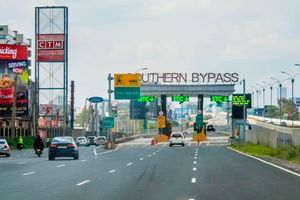The third liberation will free the people from corruption oligarchs

Lately, corrupt elites have become adept at coining phrases meant to obscure the truth.
One of the defining aspects of the elections we are going into next week is the inordinately large number of candidates facing corruption charges.
The tragedy we face as a society is that our leaders are still reluctant to look squarely in the mirror and concede that things have gone terribly wrong. The remorselessness and obduracy displayed by corrupt elites is nauseating.
In other societies, it’s not uncommon to hear a leader caught up in a scandal apologising, resigning from public office, or uttering the self-pitying cry, ‘I was misled’. Here, even leaders facing blatant corruption charges in court will be the first to go to the roof top to arrogantly chest-thump and to dismiss allegations against them as motivated by enemy conspiracy.
Lately, corrupt elites have become adept at coining phrases meant to obscure the truth. The semantics has become more and more modern and contemporary. Today, the standard refrain for corrupt elites is ‘weaponisation’. While an ordinary mortal such as a civil servant facing corruption charges quietly fights in court, the corrupt politician will be on the stumps shouting, ‘weaponisation’!
Selective prosecution
In South Africa, the phrase ‘state capture’ was used to describe the activities of a sprawling network of political operatives who were found to have used corrupt influence to take control and corner lucrative procurement deals with state-owned enterprises. In Kenya, corrupt elites have turned everything upside down and made the phrase to acquire a totally different connotation; unlike in South Africa, members of the public are being made to believe that the villain is not be the corrupt politician but the state investigative and prosecutorial authorities on the tail of corrupt politicians.
At campaign rallies, corrupt elites will always be on the stumps mouthing the rhetorical questions like: ‘why I’m I being targeted when others have also sinned? ‘This is selective prosecution! Why do we allow these self-absorbed corrupt politicians to occupy the moral high ground and to play the victim card when hundreds of civil servants facing corruption prosecutions quietly litigate their cases in court like other mortals? We have hundreds of employees of state corporations whose assets have been frozen and confiscated by the Assets Recovery Agency on allegations of corruption. Should they also be calling press conferences and giving interviews about ‘weaponisation’, ‘selective prosecution’, and ‘state capture’? Or, are these civil servants lesser mortals?
Underpinning the phenomena is a complex game of blame apportioning that corrupt elites in Kenya have become very adept at. The game is played this way: When you are accused of corruption, deflect attention from the facts of the charges against you by mentioning or publicly invoking names of others—especially politicians from the other side of the divide. That way, you build a narrative of shared guilt and shared complicity in the minds of the public.
Thus, culpability over corruption is deliberately fudged so much so that even where it’s clear to everybody that the politician has perpetrated corrupt transactions, the issue of responsibility for that irregularity is deliberately made to look controversial. Clearly, one of the reasons anti-corruption efforts don’t yield much in this country is because corrupt elites have planted in the minds of the public that everybody is corrupt and that we all sinned in the Garden of Eden.
I will always remember the sagacious words of the former CEO of the defunct Kenya Anti-Corruption Authority, Justice Aaron Ringera, while responding to claims by corrupt elites about selective prosecution. He said and I paraphrase: “When a fisherman casts his net in Lake Victoria, it is the fish snared in his net that he takes home to roast. You don’t release what you have caught just because others have escaped”.
Revolution comes like a thief
Accuse me of being an idealist if you like, but I refuse to believe that corruption and tribalism are in the DNA of every citizen of this country. If anything I believe that this society is going through fundamental changes that will eventually free the citizen from blind allegiance to the corrupt ethnic oligarchs we see today. What is the basis of my optimism? The telecommunications revolution, rapid urbanisation, better road connections that has reduced travel time from one part of the country to another, the expansion of the national electricity grid, the increasing popularity of our lingua franca—and a constitutional dispensation that has left the citizen with an elevated sense of individual rights.
Already, there are clear signs that this is a society gradually reorganising itself around broader policy issues. The growth and the increasing influence and stature of single issue group—resident associations, private sector lobby groups, and policy think tanks speak volumes about the changes that are quietly happening in our society. Like Karl Marx said, revolution comes like a thief in the night. The third liberation will be about freeing the citizen from political manipulation by the corrupt oligarchs.





